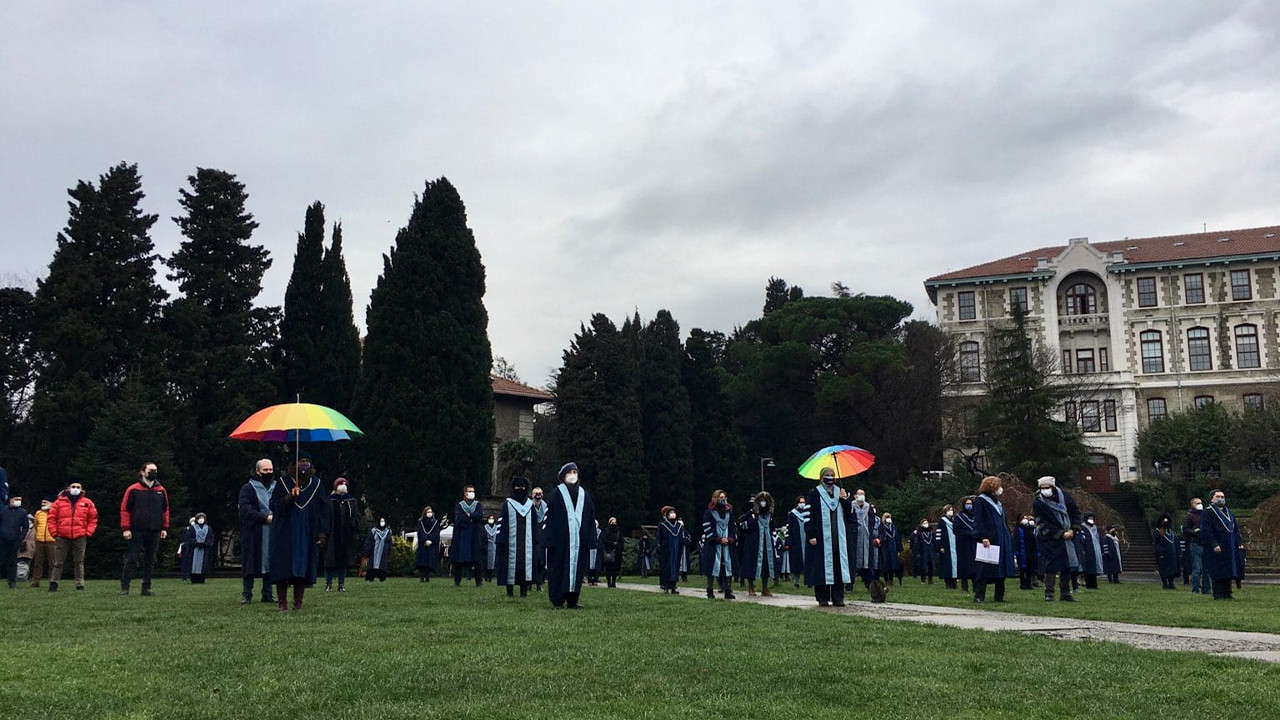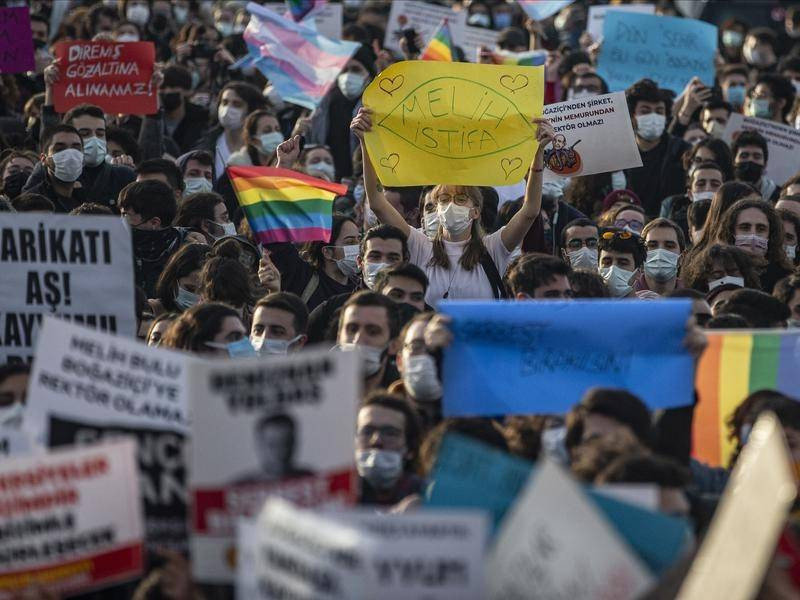‘This is a test:’ Judith Butler talks Boğaziçi protests, authoritarianism, and LGBTQI+ rights
Judith Butler, a prominent political philosopher and gender theorist spoke at an event on transnational solidarity in the wake of the ongoing protests against the Erdoğan-appointed rector of Boğaziçi University. Butler condemned the Turkish government’s violent and homophobic response to the protests and the closure of the university’s LGBTI+ student club, calling the treatment of LGBTQI+ individuals ‘a litmus test for rising authoritarianism.’
Dorothy Rau / Duvar English
“This is a test for the faculty, the civil society, and the left. Will they look the other way or will this struggle take place?”
Such were the words of Judith Butler to a group of more than 2,000 at an event discussing transnational solidarity within the context of the ongoing protests against the appointment of Melih Bulu, an Erdoğan ally, as rector to Boğaziçi University by presidential decree, as well as the violent and anti-LGBTQI+ rhetoric government officials have used to characterize the protests.
“Others may ask why are we worked up about a rector being implanted in the university by state authorities. I want to talk about why academic freedom is so important and how it relates to the ideal of democracy,” Butler said at the start of the event.
Butler, a prominent American political philosopher and gender theorist spoke with Boğaziçi students, professors, and allies at the online event co-hosted by Boğaziçi’s Phil-Free community as well as the recently shut down Boğaziçi University LGBTI+ Studies Club, saying that “the struggle for LGBTQI rights is a transnational one. It crosses every region and border,” then saying that one day, when the club was reopened, they would come and visit, as seen below.
Phil-Free, an educational community established by students from the university’s philosophy department to discuss problems regarding human rights, freedom, and equality in and outside of the university, was founded after the controversial rector appointment in order to ‘build socially aware societies since human rights seem to be far from intuitions’ one of the club’s founders Sina Ersan told Duvar English.
Beliz İmge Bayulgen, a student activist, also spoke during the event with Prof. Butler about the violence and ‘sadism,’ a term used by Butler, seen in response to the protests.
‘Attacks on LGBTQI people are becoming the norm’
“What is contagious here is the excitement gotten out of the infliction of pain towards us as students. That is, quite literally, the definition of sadism and should be called out as such,” Bayulgen told Duvar English.
The violent police response to the Boğaziçi protests has been shared globally through videos and images of the protests depicting students being beaten with sticks, thrown to the ground, having their masks torn off, and carried off by police.
“Attacks on LGBTQI people are becoming the norm of authoritarian regimes. It’s like a signature,” Butler said, then compared Turkey’s government to other global ‘authoritarian’ states such as Hungary, Romania, Poland, and Brazil.

Since Jan 4, when the protests began, over 500 people have been detained in connection to the protests around Istanbul as well as in Ankara, with 11 arrests, 9 students still in jail, and 27 home detentions. Those that were detained faced gross rights abuses at the hands of police such as violence, forced naked searches, verbal harassment, and excessive force, according to reports.
Gov't officials vocal about support of violence and oppression
“State authorities look the other way and are sometimes quietly clapping off stage,” Butler added about the oppression of students in connection to the protests.
However, in the case of the Boğaziçi protests, Turkey’s state authorities have been far from quiet about their opposition to the protests and their desire for violence against protesters. They have used violent rhetoric to refer to the protesters.
“Why should I talk with the students? Terrorists are the ones that are involved in it,” said President Erdoğan in reference to the protests, while his ruling alliance partner Devlet Bahçeli referred to the protesters as “terrorists,” “barbarians,” and “poisonous snakes whose heads need to be crushed.”
Additionally, the rhetoric has been explicitly homophobic, with Interior Minister Suleyman Soylu repeatedly calling the arrested students “LGBT perverts” and Erdoğan praising his party’s youth saying, “You are not the LGBT youth.”
‘A litmus test for rising authoritarianism’
Such statements have sparked global outrage over the events and raised concerns about the implications of such vitriol on the state of Turkey’s democracy.
“The treatment of LGBTI+ people is a litmus test for rising authoritarianism,” Butler said during the event when the discussion turned to the language of government officials as well as the closure of the Boğaziçi University LGBTI+ Studies Club, which had been kept in ‘candidate’ status since its founding in 2014 and was shut down shortly after Melih Bulu was appointed rector.
“LGBTQI people have always been part of Boğaziçi and the only question is whether their lives will be affirmed or criminalized and whether they will continue to be denounced and demonized and imprisoned,” Butler said when asked about the closure of the club, adding that the work and participation of Turkey’s LGBTQI+ community has led to “some of the most inspiring moments in Turkish activism in the last decade.”

Both have added their voices to the pile of global condemnation of the government’s response to student demands for democracy, including Noam Chomsky as well as 3,317 international academics who released a joint statement condemning the Turkish government’s violent response to the protesters and calling on Melih Bulu to resign as rector and withdraw charges against those students still in custody.
Such violence has also drawn the attention of the U.S., the United Nations Human Rights Office, the EU Commission, as well as a number of prominent human rights organizations such as Amnesty International and Human Rights Watch.
'I will follow your lead'
The conversation with Butler also included discussion of the future of the movement, the need to strengthen and expand solidarity networks, and ways in which the international community can best support the movement.
“[Judith Butler] saying ‘I’ll follow your lead’ allows us to conceptualize academic involvement in movements for social change through genuine dialogue. I believe their participation goes beyond raising awareness, it amplifies what we’ve been saying which is that the erosion of academic freedom and human rights in Turkey has larger implications on threats to rights and freedoms everywhere,” the student activist Bayulgen said about the event.
Butler concluded the event on a note of solidarity, saying “Whatever you decide to ask of the rest of us, or decide to do next, we will walk with you, be with you, stand by you. I will follow your lead.”
